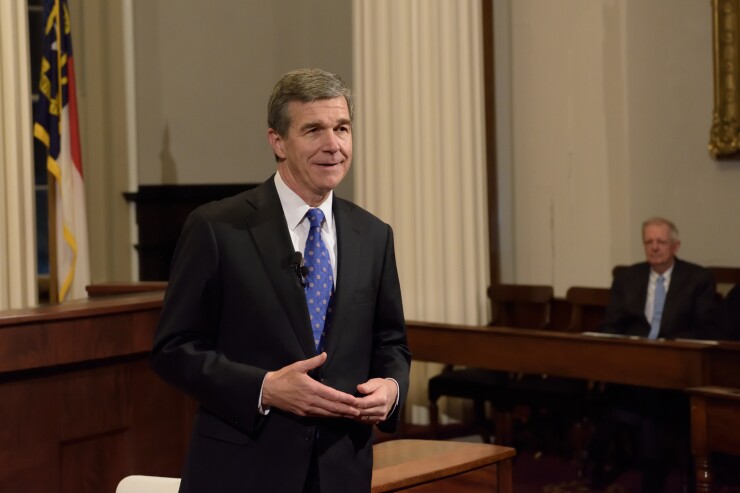BRADENTON, Fla. - In a move that probably will be symbolic, North Carolina’s Democratic Gov. Roy Cooper will veto his first budget.
In a press conference Monday, Cooper said the biennial budget passed by the GOP-controlled Legislature prioritizes tax breaks for the wealthy and corporations at the expense of middle class families, and fails to properly fund education.
“Simply put, this budget shortchanges our state at a time when we don’t have to,” Cooper said. “Rather than matching the dreams and aspirations of our people, this budget is shortsighted and small-minded.”

The two-year spending plan called for a $23.3 billion general fund budget for fiscal 2018, a 3.1% increase over the current year, and a $23.65 billion budget for fiscal 2019.
Cooper acknowledged that the Legislature is likely to override the veto; Republicans have supermajorities in both houses greater than the three-fifths needed for an override. Cooper had called the spending plan “fiscally irresponsible.”
Although lawmakers argued otherwise, Cooper said their budget provided significantly less funding for teachers' pay than he proposed.
“Republican legislators say they did what I asked and that their teacher pay plan matches my proposal. That is false,” he said. “Tell me how the $810 million I proposed for teacher pay matches the $470 million they proposed. It doesn’t.”
Cooper said the GOP’s budget “siphons taxpayer dollars away from public schools and into private school vouchers with little accountability.”
The budget also targets new sources of funding for charter schools that could set a precedent, according to a letter from North Carolina Department of Transportation James Trogdon.
Trogdon said he was satisfied with the level of funding for the DOT, but that the budget would transfer $2.5 million from his agency to the Department of Public Instruction for a pilot charter school transportation grant program.
“This item could set a new precedent for transferring highway funds for school transportation needs,” Trogdon wrote.
Cooper also said Monday that the budget will become structurally unbalanced because of tax cuts and the use of nonrecurring funds for recurring expenses in fiscal 2019.
More than $90 million in recurring expenses are funded using nonrecurring revenues in the second year of the Legislature’s spending plan, according to a letter from State Budget Director Charles Perusse.
“This problem is compounded in later years, when tax reductions, combined with recurring expenditures, will not adequately meet growth in population and inflation,” Perusse said. “Conservatively, we anticipate this budget would blow a $600 million hole just to meet current service levels.”
Beginning Jan. 1, 2019, the budget provides for lowering the personal income tax rate to 5.25% from 5.49%, and increasing standard deductions between $1,000 and $1,250. It also would lower the tax rate imposed on corporations to 2.5% from 3%.
The Legislature also cut the tax rate corporations pay to 3% from 4% as of Jan. 1, 2017.
Perusse said the state’s economic condition is currently stable, and there are no cash management problems.
However, he said several measures in the budget create “a self-inflicted fiscal crisis that needlessly hinders the administration’s ability to provide adequate service levels to the citizens of the state.”
One measure eliminates the $5 million in annual recurring funding for the contingency and emergency fund and transfers $7 million of the fund’s $8.8 million to the general fund, Perusse said.
“These actions restrict the ability to adequately respond to natural disasters or emergencies, fund court or Industrial Commission orders, crime rewards, death benefits, and wrongful imprisonment payments,” he said.
Shortly after passing the budget, top GOP lawmakers launched a campaign stating how much it resembled the governor’s spending plan.
Senate President Pro Tem Phil Berger said during a news conference that the “governor should spare us the melodrama” and sign the budget.
Under North Carolina law, the governor doesn’t have line-item veto power; he can only sign or veto the budget.
Cooper, who was sworn into office Jan. 1, is only the second governor to veto a budget. In 2011, former Gov. Beverly Perdue, also a Democrat, vetoed the budget, which was overridden by Republicans.
North Carolina only authorized gubernatorial budget vetoes in 1996.





